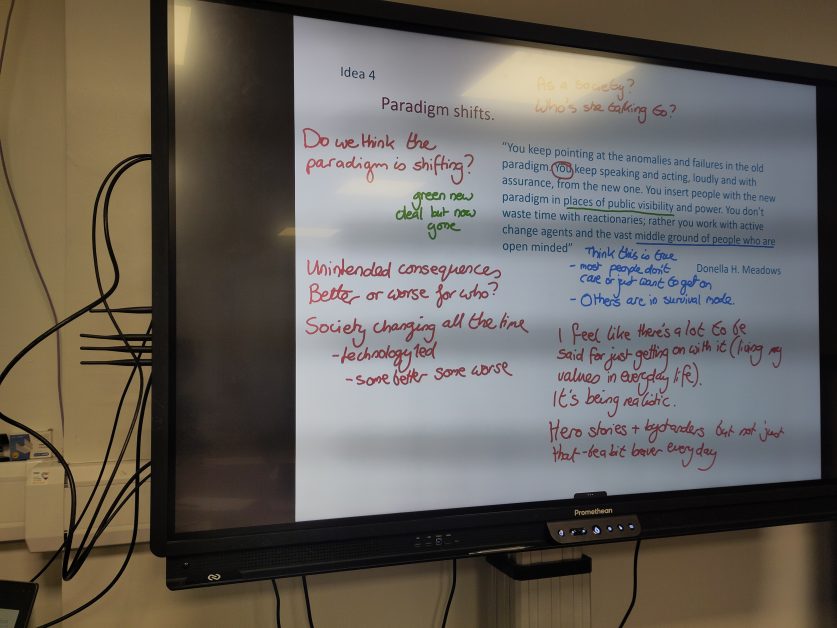Introduction
In earlier conversations, we’ve discussed our dissatisfaction with a focus on individual behaviour and believe that systems need to change to tackle the climate crisis. How do you change the philosophy and structure of a society? For example, how do we change from being structured around capitalism to a completely different way of understanding the world, like anarchism?
Idea: There are big, unstated, shared beliefs and assumptions in society.
Paradigms are:
Shared social agreements about the nature of reality.
Donnella H. Meadows Thinking in Systems
We spent a little time understanding what a paradigm is, and how it might be different from other concepts like ‘values’ or ‘systems’
- How many people need to share an idea for it to be a paradigm?
- An example of a paradigm is that you can own things. In The Dispossessed Ursula K. Le Guin imagines a society where no one owns things. They use what they need but don’t have words like ‘mine’. instead, they’d say ‘The one that I’m using’
- Is the idea that it’s okay to steal a paradigm?
- Maybe the paradigm is that you can own things.
- Then we have a system with ownership rights, courts, social norms, legal penalties and so on reinforcing the paradigm.
We found it difficult to imagine a radically different society based on alternative paradigms.
- It’s hard to imagine a sharing society coming into being. We’re so far away from it.
- My view is it’d be good to get back to shared, re-nationalised services.
- I went to a talk by Natalie Benett who talked about how the neo-liberals were just a bunch of people meeting in rooms, talking about fringe ideas, and they managed to alter our society radically. She said why couldn’t we?
- But it’s hard to see that happening.
- Wealth translates to power.
- Really shit things just keep on happening.
- But it’s hard to see that happening.
- What is it going to take for these big ideas to change? They keep failing but somehow it doesn’t seem to change.
Paradigm shifts
How do you change a paradigm?
You keep pointing at the anomolies and failures in the old paradigm. You keep speaking loudly and acting, loudly and with assurance, from th new one. You insert people with the new paradigm in places of public visibility and power. You don’t waste time with reactionaries; rather you work with active change agents and the vast middle ground of people who are open minded.
Donnella H. Meadows Thinking in Systems
Our thoughts on this:
- Are we supposed to do this as a society? Who is she talking to?
- Do we think the paradigm is shifting?
- There was a lot of talk about a Green New Deal but now that has gone.
- There are unintended consequences of change. The new paradigm is better or worse for who?
- Society is changing all the time.
- I think it is technology-led.
- Some changes are better and some are worse.
- I think a lot to be said for just getting on with it (living my values in everyday life).
- It’s being realistic.
- We have stories about heroes and bystanders. But there’s more going on than that. I’d like to be a bit braver in everyday life.

What do you think or feel at the end of today’s conversation?
- What I found really valuable was realising it’s too big. You have to work on the tiny things. I don’t feel I need to come back to this topic. It’s overwhelming.
- It’s too big for us to influence.
- It’s complex.
- It can make you feel hopeless and helpless.
- I’ve heard of paradigms before but didn’t really know what it meant. That’s been useful.
- I’d like to revisit this topic, consider its implications for activism, and talk more naturally and fluently about systems and the influence of paradigms.
- I think there is a paradigm shift regarding climate change. It’s now widely accepted as a fact.
References
Ursula K. Le Guin The Dispossessed
Donnella H. Meadows Thinking in Systems: A Primer